Reflective Report: Exploring Learning Models and Career Progression
VerifiedAdded on 2020/11/23
|15
|3565
|183
Report
AI Summary
This reflective report provides a comprehensive analysis of learning models, team dynamics, and career development strategies. The report begins with an introduction outlining the author's current role as a waiter at Novikov restaurant and bar in London, followed by a discussion of Kolb's learning theory, detailing each stage (concrete experience, reflective observation, abstract conceptualization, and active experimentation) and how it applies to the author's experiences. Furthermore, the report uses Gibbs' reflective cycle and John's model to analyze and evaluate interview experiences and behavior, highlighting the importance of self-awareness and continuous improvement. The report also explores team dynamics through Tuckman's stages of team development and Belbin's team roles. Finally, the report concludes with a career development plan that incorporates SWOT analysis and SMART goals for achieving professional objectives.
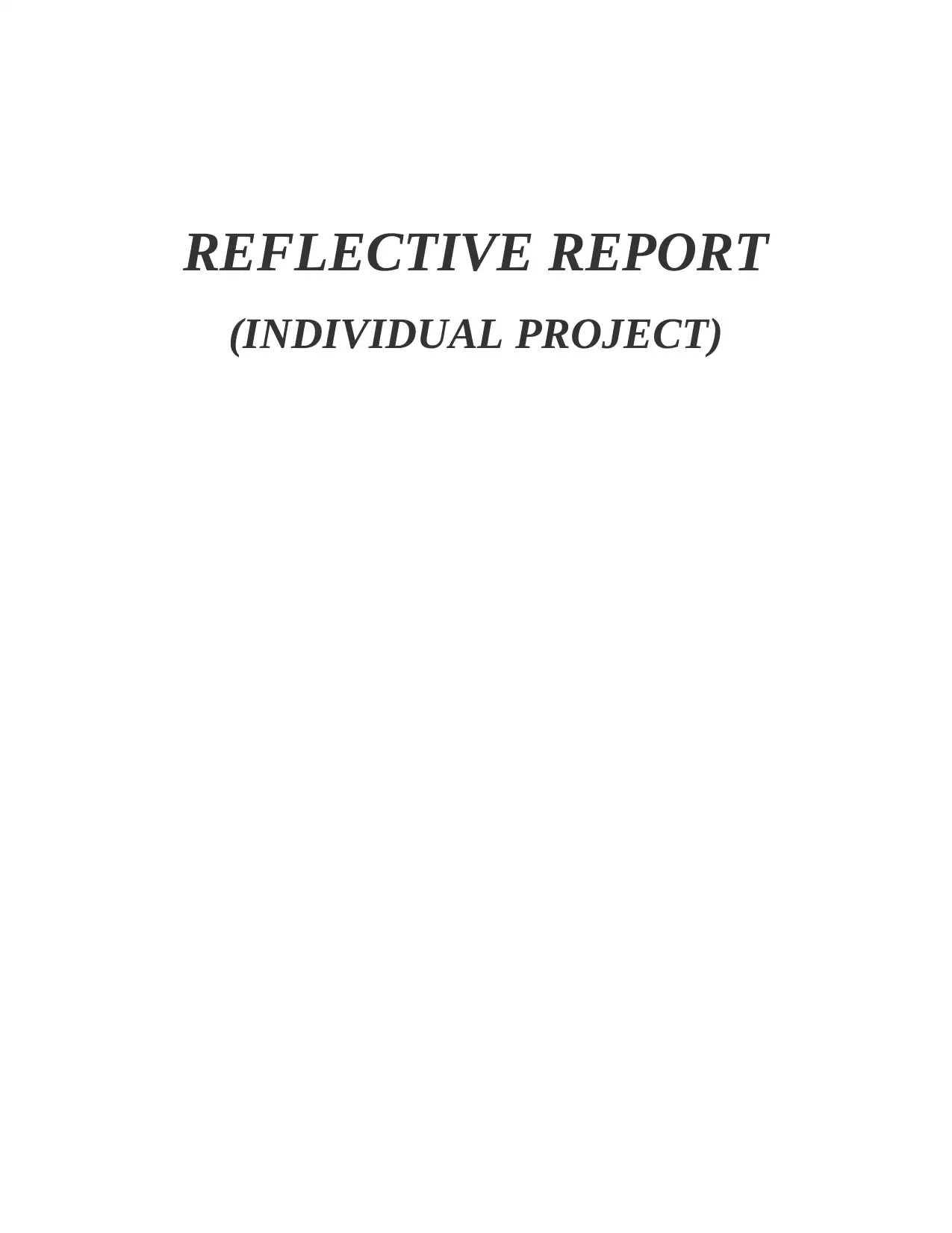
REFLECTIVE REPORT
(INDIVIDUAL PROJECT)
(INDIVIDUAL PROJECT)
Paraphrase This Document
Need a fresh take? Get an instant paraphrase of this document with our AI Paraphraser
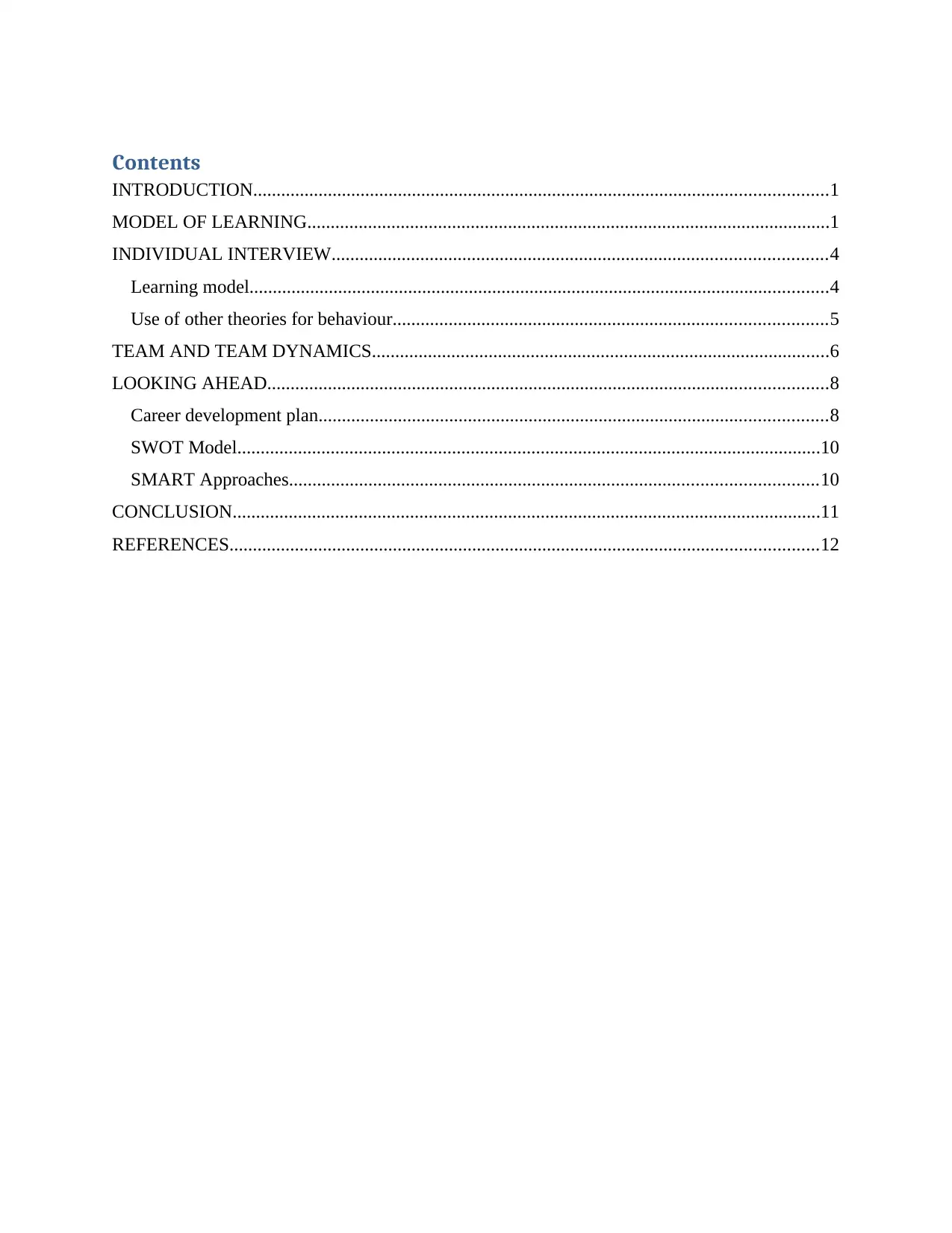
Contents
INTRODUCTION...........................................................................................................................1
MODEL OF LEARNING................................................................................................................1
INDIVIDUAL INTERVIEW..........................................................................................................4
Learning model............................................................................................................................4
Use of other theories for behaviour.............................................................................................5
TEAM AND TEAM DYNAMICS..................................................................................................6
LOOKING AHEAD........................................................................................................................8
Career development plan.............................................................................................................8
SWOT Model.............................................................................................................................10
SMART Approaches.................................................................................................................10
CONCLUSION..............................................................................................................................11
REFERENCES..............................................................................................................................12
INTRODUCTION...........................................................................................................................1
MODEL OF LEARNING................................................................................................................1
INDIVIDUAL INTERVIEW..........................................................................................................4
Learning model............................................................................................................................4
Use of other theories for behaviour.............................................................................................5
TEAM AND TEAM DYNAMICS..................................................................................................6
LOOKING AHEAD........................................................................................................................8
Career development plan.............................................................................................................8
SWOT Model.............................................................................................................................10
SMART Approaches.................................................................................................................10
CONCLUSION..............................................................................................................................11
REFERENCES..............................................................................................................................12
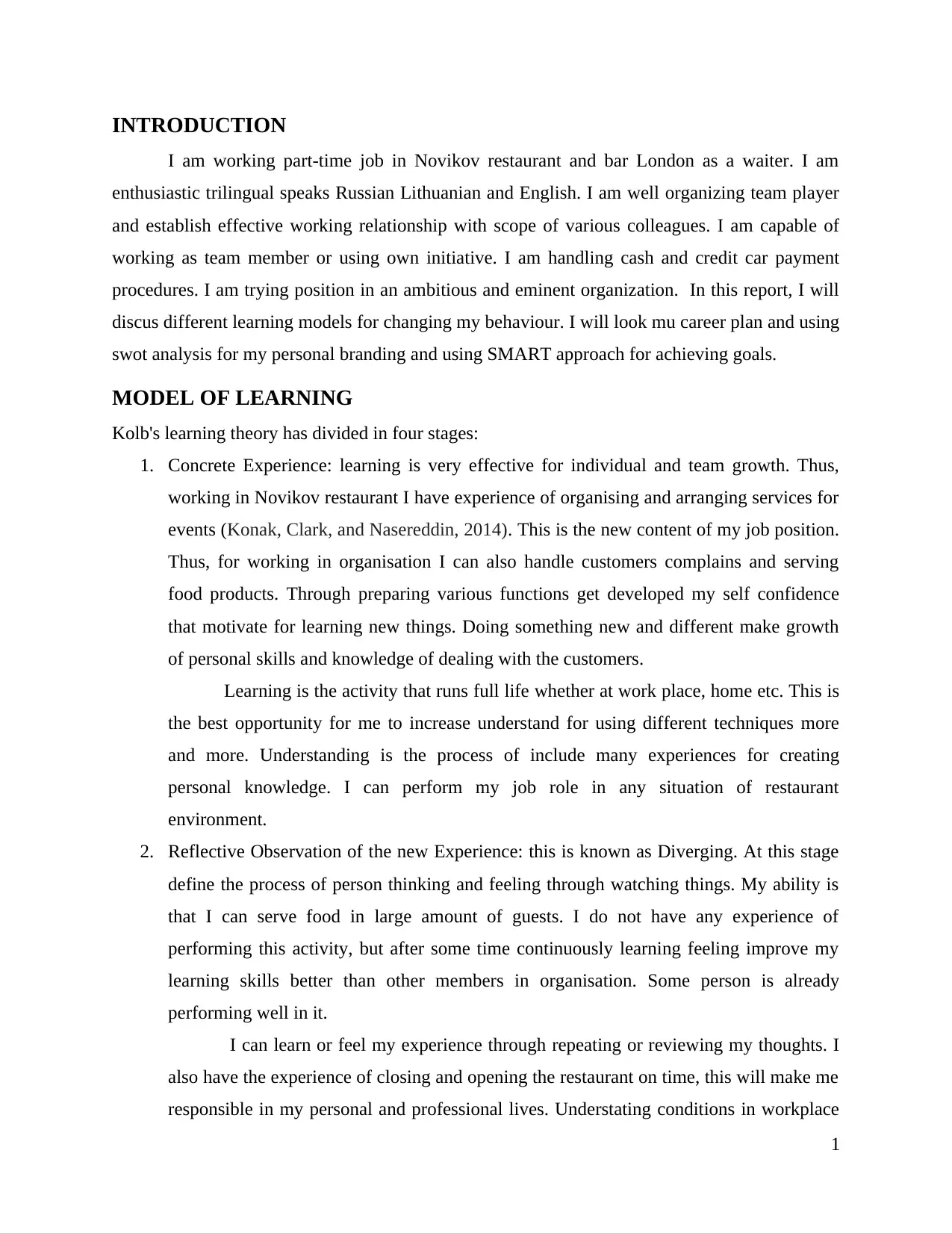
INTRODUCTION
I am working part-time job in Novikov restaurant and bar London as a waiter. I am
enthusiastic trilingual speaks Russian Lithuanian and English. I am well organizing team player
and establish effective working relationship with scope of various colleagues. I am capable of
working as team member or using own initiative. I am handling cash and credit car payment
procedures. I am trying position in an ambitious and eminent organization. In this report, I will
discus different learning models for changing my behaviour. I will look mu career plan and using
swot analysis for my personal branding and using SMART approach for achieving goals.
MODEL OF LEARNING
Kolb's learning theory has divided in four stages:
1. Concrete Experience: learning is very effective for individual and team growth. Thus,
working in Novikov restaurant I have experience of organising and arranging services for
events (Konak, Clark, and Nasereddin, 2014). This is the new content of my job position.
Thus, for working in organisation I can also handle customers complains and serving
food products. Through preparing various functions get developed my self confidence
that motivate for learning new things. Doing something new and different make growth
of personal skills and knowledge of dealing with the customers.
Learning is the activity that runs full life whether at work place, home etc. This is
the best opportunity for me to increase understand for using different techniques more
and more. Understanding is the process of include many experiences for creating
personal knowledge. I can perform my job role in any situation of restaurant
environment.
2. Reflective Observation of the new Experience: this is known as Diverging. At this stage
define the process of person thinking and feeling through watching things. My ability is
that I can serve food in large amount of guests. I do not have any experience of
performing this activity, but after some time continuously learning feeling improve my
learning skills better than other members in organisation. Some person is already
performing well in it.
I can learn or feel my experience through repeating or reviewing my thoughts. I
also have the experience of closing and opening the restaurant on time, this will make me
responsible in my personal and professional lives. Understating conditions in workplace
1
I am working part-time job in Novikov restaurant and bar London as a waiter. I am
enthusiastic trilingual speaks Russian Lithuanian and English. I am well organizing team player
and establish effective working relationship with scope of various colleagues. I am capable of
working as team member or using own initiative. I am handling cash and credit car payment
procedures. I am trying position in an ambitious and eminent organization. In this report, I will
discus different learning models for changing my behaviour. I will look mu career plan and using
swot analysis for my personal branding and using SMART approach for achieving goals.
MODEL OF LEARNING
Kolb's learning theory has divided in four stages:
1. Concrete Experience: learning is very effective for individual and team growth. Thus,
working in Novikov restaurant I have experience of organising and arranging services for
events (Konak, Clark, and Nasereddin, 2014). This is the new content of my job position.
Thus, for working in organisation I can also handle customers complains and serving
food products. Through preparing various functions get developed my self confidence
that motivate for learning new things. Doing something new and different make growth
of personal skills and knowledge of dealing with the customers.
Learning is the activity that runs full life whether at work place, home etc. This is
the best opportunity for me to increase understand for using different techniques more
and more. Understanding is the process of include many experiences for creating
personal knowledge. I can perform my job role in any situation of restaurant
environment.
2. Reflective Observation of the new Experience: this is known as Diverging. At this stage
define the process of person thinking and feeling through watching things. My ability is
that I can serve food in large amount of guests. I do not have any experience of
performing this activity, but after some time continuously learning feeling improve my
learning skills better than other members in organisation. Some person is already
performing well in it.
I can learn or feel my experience through repeating or reviewing my thoughts. I
also have the experience of closing and opening the restaurant on time, this will make me
responsible in my personal and professional lives. Understating conditions in workplace
1
⊘ This is a preview!⊘
Do you want full access?
Subscribe today to unlock all pages.

Trusted by 1+ million students worldwide
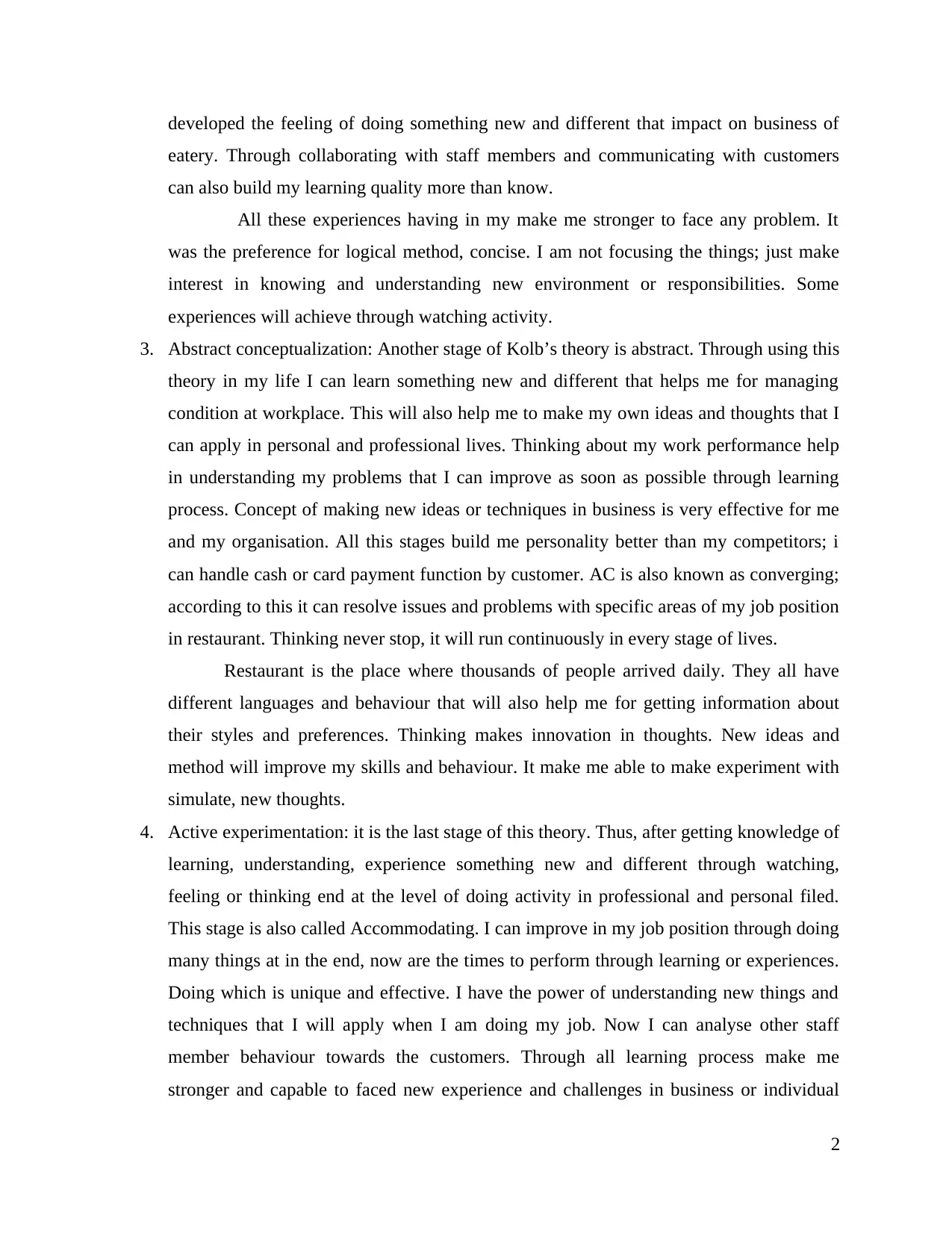
developed the feeling of doing something new and different that impact on business of
eatery. Through collaborating with staff members and communicating with customers
can also build my learning quality more than know.
All these experiences having in my make me stronger to face any problem. It
was the preference for logical method, concise. I am not focusing the things; just make
interest in knowing and understanding new environment or responsibilities. Some
experiences will achieve through watching activity.
3. Abstract conceptualization: Another stage of Kolb’s theory is abstract. Through using this
theory in my life I can learn something new and different that helps me for managing
condition at workplace. This will also help me to make my own ideas and thoughts that I
can apply in personal and professional lives. Thinking about my work performance help
in understanding my problems that I can improve as soon as possible through learning
process. Concept of making new ideas or techniques in business is very effective for me
and my organisation. All this stages build me personality better than my competitors; i
can handle cash or card payment function by customer. AC is also known as converging;
according to this it can resolve issues and problems with specific areas of my job position
in restaurant. Thinking never stop, it will run continuously in every stage of lives.
Restaurant is the place where thousands of people arrived daily. They all have
different languages and behaviour that will also help me for getting information about
their styles and preferences. Thinking makes innovation in thoughts. New ideas and
method will improve my skills and behaviour. It make me able to make experiment with
simulate, new thoughts.
4. Active experimentation: it is the last stage of this theory. Thus, after getting knowledge of
learning, understanding, experience something new and different through watching,
feeling or thinking end at the level of doing activity in professional and personal filed.
This stage is also called Accommodating. I can improve in my job position through doing
many things at in the end, now are the times to perform through learning or experiences.
Doing which is unique and effective. I have the power of understanding new things and
techniques that I will apply when I am doing my job. Now I can analyse other staff
member behaviour towards the customers. Through all learning process make me
stronger and capable to faced new experience and challenges in business or individual
2
eatery. Through collaborating with staff members and communicating with customers
can also build my learning quality more than know.
All these experiences having in my make me stronger to face any problem. It
was the preference for logical method, concise. I am not focusing the things; just make
interest in knowing and understanding new environment or responsibilities. Some
experiences will achieve through watching activity.
3. Abstract conceptualization: Another stage of Kolb’s theory is abstract. Through using this
theory in my life I can learn something new and different that helps me for managing
condition at workplace. This will also help me to make my own ideas and thoughts that I
can apply in personal and professional lives. Thinking about my work performance help
in understanding my problems that I can improve as soon as possible through learning
process. Concept of making new ideas or techniques in business is very effective for me
and my organisation. All this stages build me personality better than my competitors; i
can handle cash or card payment function by customer. AC is also known as converging;
according to this it can resolve issues and problems with specific areas of my job position
in restaurant. Thinking never stop, it will run continuously in every stage of lives.
Restaurant is the place where thousands of people arrived daily. They all have
different languages and behaviour that will also help me for getting information about
their styles and preferences. Thinking makes innovation in thoughts. New ideas and
method will improve my skills and behaviour. It make me able to make experiment with
simulate, new thoughts.
4. Active experimentation: it is the last stage of this theory. Thus, after getting knowledge of
learning, understanding, experience something new and different through watching,
feeling or thinking end at the level of doing activity in professional and personal filed.
This stage is also called Accommodating. I can improve in my job position through doing
many things at in the end, now are the times to perform through learning or experiences.
Doing which is unique and effective. I have the power of understanding new things and
techniques that I will apply when I am doing my job. Now I can analyse other staff
member behaviour towards the customers. Through all learning process make me
stronger and capable to faced new experience and challenges in business or individual
2
Paraphrase This Document
Need a fresh take? Get an instant paraphrase of this document with our AI Paraphraser
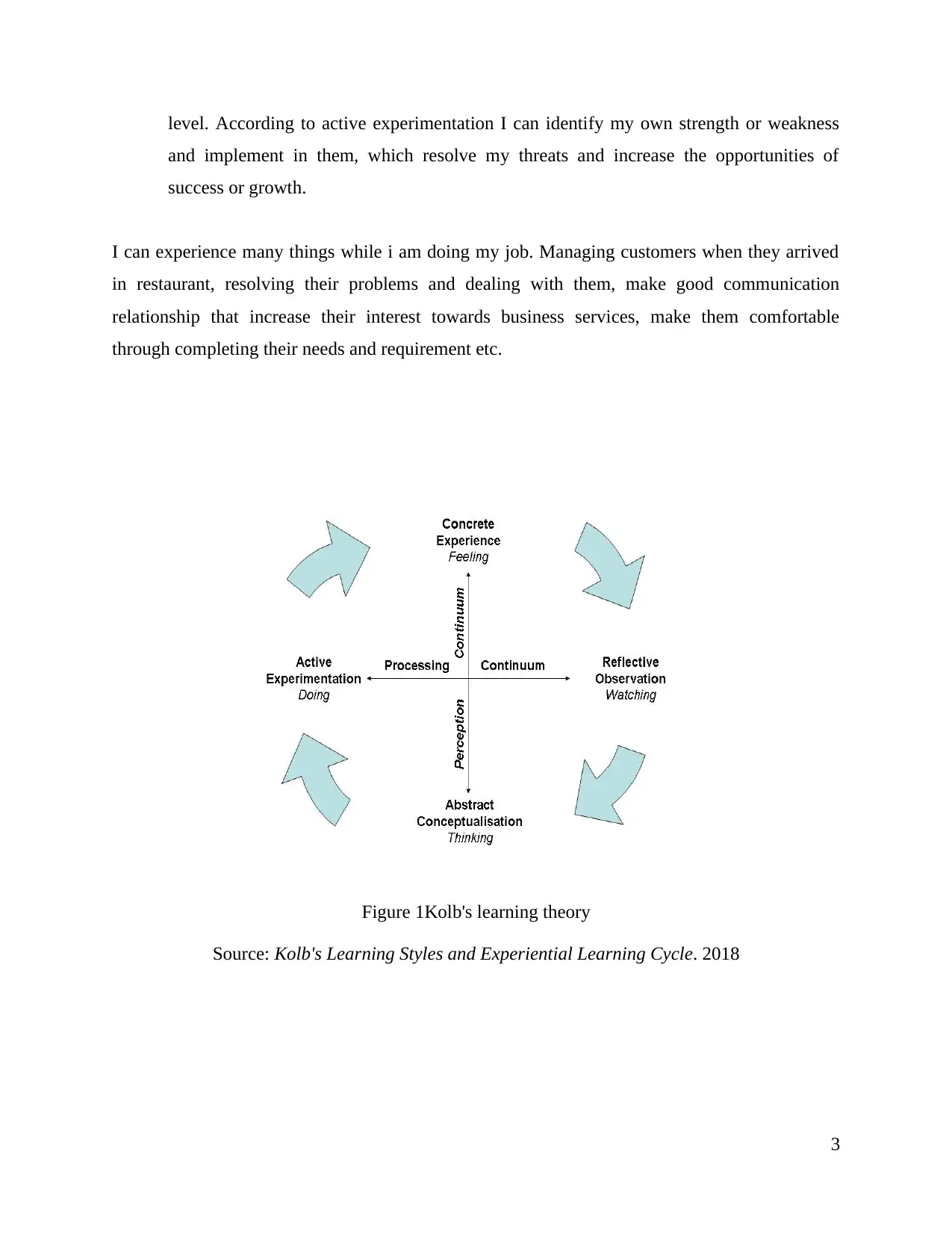
level. According to active experimentation I can identify my own strength or weakness
and implement in them, which resolve my threats and increase the opportunities of
success or growth.
I can experience many things while i am doing my job. Managing customers when they arrived
in restaurant, resolving their problems and dealing with them, make good communication
relationship that increase their interest towards business services, make them comfortable
through completing their needs and requirement etc.
Figure 1Kolb's learning theory
Source: Kolb's Learning Styles and Experiential Learning Cycle. 2018
3
and implement in them, which resolve my threats and increase the opportunities of
success or growth.
I can experience many things while i am doing my job. Managing customers when they arrived
in restaurant, resolving their problems and dealing with them, make good communication
relationship that increase their interest towards business services, make them comfortable
through completing their needs and requirement etc.
Figure 1Kolb's learning theory
Source: Kolb's Learning Styles and Experiential Learning Cycle. 2018
3
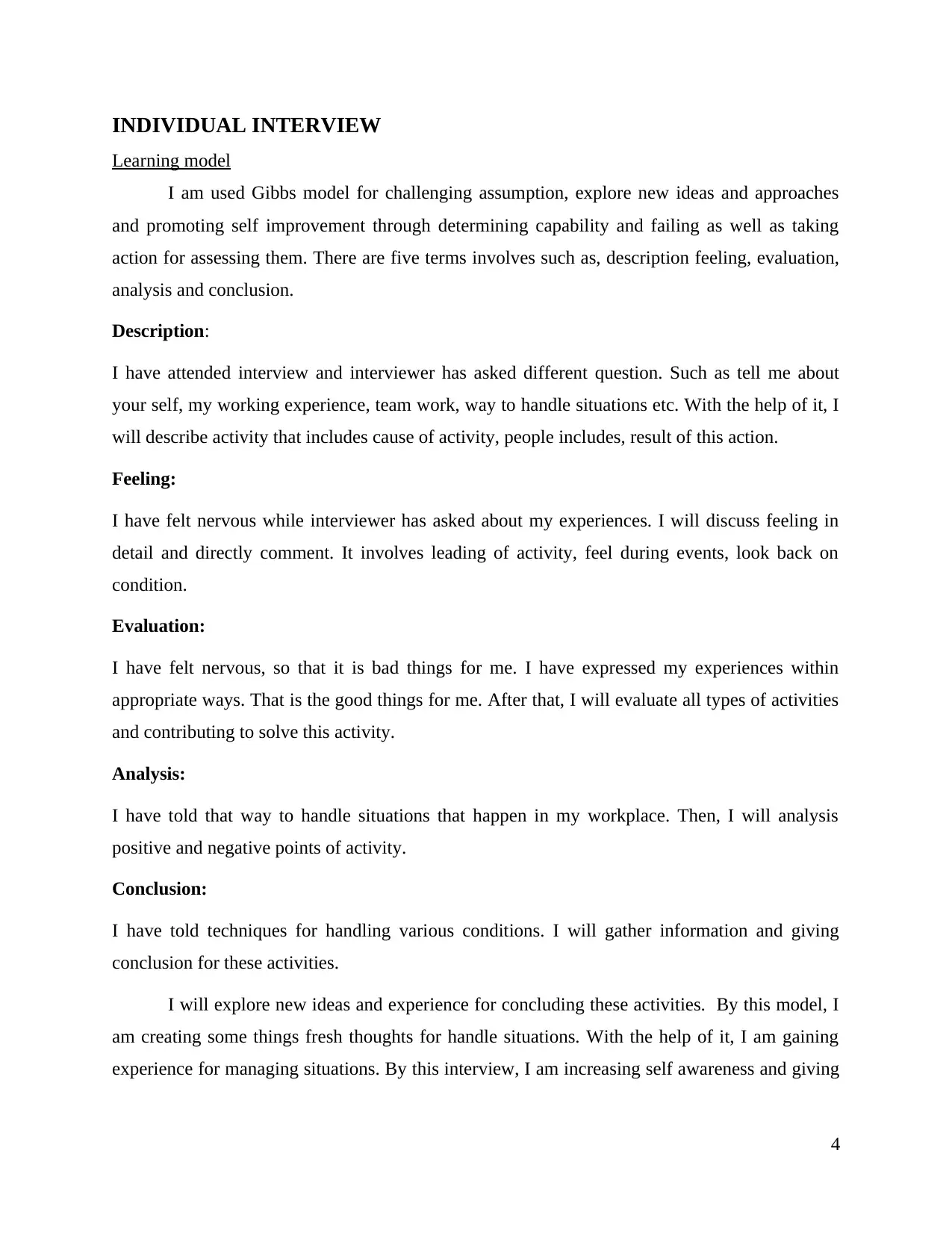
INDIVIDUAL INTERVIEW
Learning model
I am used Gibbs model for challenging assumption, explore new ideas and approaches
and promoting self improvement through determining capability and failing as well as taking
action for assessing them. There are five terms involves such as, description feeling, evaluation,
analysis and conclusion.
Description:
I have attended interview and interviewer has asked different question. Such as tell me about
your self, my working experience, team work, way to handle situations etc. With the help of it, I
will describe activity that includes cause of activity, people includes, result of this action.
Feeling:
I have felt nervous while interviewer has asked about my experiences. I will discuss feeling in
detail and directly comment. It involves leading of activity, feel during events, look back on
condition.
Evaluation:
I have felt nervous, so that it is bad things for me. I have expressed my experiences within
appropriate ways. That is the good things for me. After that, I will evaluate all types of activities
and contributing to solve this activity.
Analysis:
I have told that way to handle situations that happen in my workplace. Then, I will analysis
positive and negative points of activity.
Conclusion:
I have told techniques for handling various conditions. I will gather information and giving
conclusion for these activities.
I will explore new ideas and experience for concluding these activities. By this model, I
am creating some things fresh thoughts for handle situations. With the help of it, I am gaining
experience for managing situations. By this interview, I am increasing self awareness and giving
4
Learning model
I am used Gibbs model for challenging assumption, explore new ideas and approaches
and promoting self improvement through determining capability and failing as well as taking
action for assessing them. There are five terms involves such as, description feeling, evaluation,
analysis and conclusion.
Description:
I have attended interview and interviewer has asked different question. Such as tell me about
your self, my working experience, team work, way to handle situations etc. With the help of it, I
will describe activity that includes cause of activity, people includes, result of this action.
Feeling:
I have felt nervous while interviewer has asked about my experiences. I will discuss feeling in
detail and directly comment. It involves leading of activity, feel during events, look back on
condition.
Evaluation:
I have felt nervous, so that it is bad things for me. I have expressed my experiences within
appropriate ways. That is the good things for me. After that, I will evaluate all types of activities
and contributing to solve this activity.
Analysis:
I have told that way to handle situations that happen in my workplace. Then, I will analysis
positive and negative points of activity.
Conclusion:
I have told techniques for handling various conditions. I will gather information and giving
conclusion for these activities.
I will explore new ideas and experience for concluding these activities. By this model, I
am creating some things fresh thoughts for handle situations. With the help of it, I am gaining
experience for managing situations. By this interview, I am increasing self awareness and giving
4
⊘ This is a preview!⊘
Do you want full access?
Subscribe today to unlock all pages.

Trusted by 1+ million students worldwide
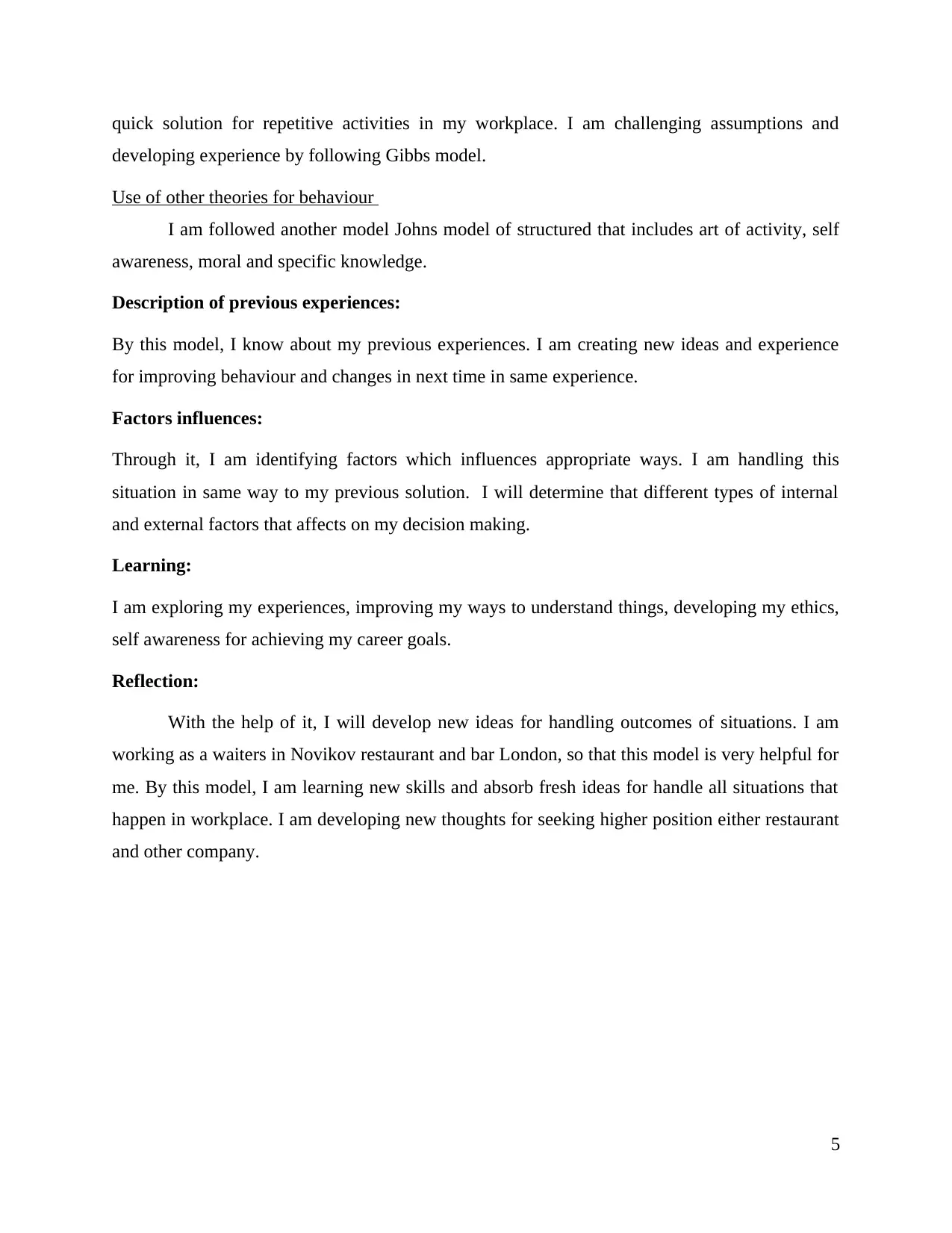
quick solution for repetitive activities in my workplace. I am challenging assumptions and
developing experience by following Gibbs model.
Use of other theories for behaviour
I am followed another model Johns model of structured that includes art of activity, self
awareness, moral and specific knowledge.
Description of previous experiences:
By this model, I know about my previous experiences. I am creating new ideas and experience
for improving behaviour and changes in next time in same experience.
Factors influences:
Through it, I am identifying factors which influences appropriate ways. I am handling this
situation in same way to my previous solution. I will determine that different types of internal
and external factors that affects on my decision making.
Learning:
I am exploring my experiences, improving my ways to understand things, developing my ethics,
self awareness for achieving my career goals.
Reflection:
With the help of it, I will develop new ideas for handling outcomes of situations. I am
working as a waiters in Novikov restaurant and bar London, so that this model is very helpful for
me. By this model, I am learning new skills and absorb fresh ideas for handle all situations that
happen in workplace. I am developing new thoughts for seeking higher position either restaurant
and other company.
5
developing experience by following Gibbs model.
Use of other theories for behaviour
I am followed another model Johns model of structured that includes art of activity, self
awareness, moral and specific knowledge.
Description of previous experiences:
By this model, I know about my previous experiences. I am creating new ideas and experience
for improving behaviour and changes in next time in same experience.
Factors influences:
Through it, I am identifying factors which influences appropriate ways. I am handling this
situation in same way to my previous solution. I will determine that different types of internal
and external factors that affects on my decision making.
Learning:
I am exploring my experiences, improving my ways to understand things, developing my ethics,
self awareness for achieving my career goals.
Reflection:
With the help of it, I will develop new ideas for handling outcomes of situations. I am
working as a waiters in Novikov restaurant and bar London, so that this model is very helpful for
me. By this model, I am learning new skills and absorb fresh ideas for handle all situations that
happen in workplace. I am developing new thoughts for seeking higher position either restaurant
and other company.
5
Paraphrase This Document
Need a fresh take? Get an instant paraphrase of this document with our AI Paraphraser
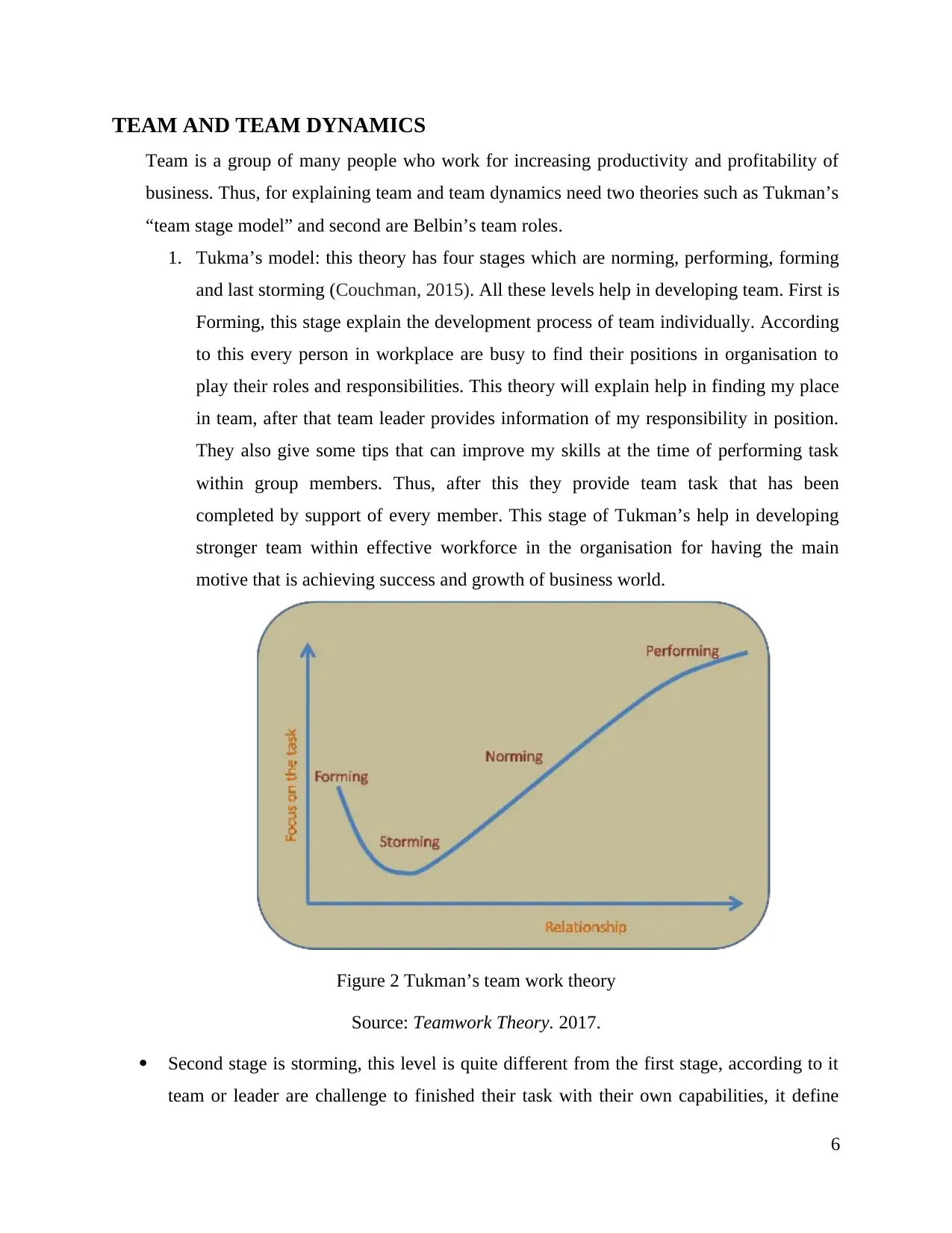
TEAM AND TEAM DYNAMICS
Team is a group of many people who work for increasing productivity and profitability of
business. Thus, for explaining team and team dynamics need two theories such as Tukman’s
“team stage model” and second are Belbin’s team roles.
1. Tukma’s model: this theory has four stages which are norming, performing, forming
and last storming (Couchman, 2015). All these levels help in developing team. First is
Forming, this stage explain the development process of team individually. According
to this every person in workplace are busy to find their positions in organisation to
play their roles and responsibilities. This theory will explain help in finding my place
in team, after that team leader provides information of my responsibility in position.
They also give some tips that can improve my skills at the time of performing task
within group members. Thus, after this they provide team task that has been
completed by support of every member. This stage of Tukman’s help in developing
stronger team within effective workforce in the organisation for having the main
motive that is achieving success and growth of business world.
Figure 2 Tukman’s team work theory
Source: Teamwork Theory. 2017.
Second stage is storming, this level is quite different from the first stage, according to it
team or leader are challenge to finished their task with their own capabilities, it define
6
Team is a group of many people who work for increasing productivity and profitability of
business. Thus, for explaining team and team dynamics need two theories such as Tukman’s
“team stage model” and second are Belbin’s team roles.
1. Tukma’s model: this theory has four stages which are norming, performing, forming
and last storming (Couchman, 2015). All these levels help in developing team. First is
Forming, this stage explain the development process of team individually. According
to this every person in workplace are busy to find their positions in organisation to
play their roles and responsibilities. This theory will explain help in finding my place
in team, after that team leader provides information of my responsibility in position.
They also give some tips that can improve my skills at the time of performing task
within group members. Thus, after this they provide team task that has been
completed by support of every member. This stage of Tukman’s help in developing
stronger team within effective workforce in the organisation for having the main
motive that is achieving success and growth of business world.
Figure 2 Tukman’s team work theory
Source: Teamwork Theory. 2017.
Second stage is storming, this level is quite different from the first stage, according to it
team or leader are challenge to finished their task with their own capabilities, it define
6
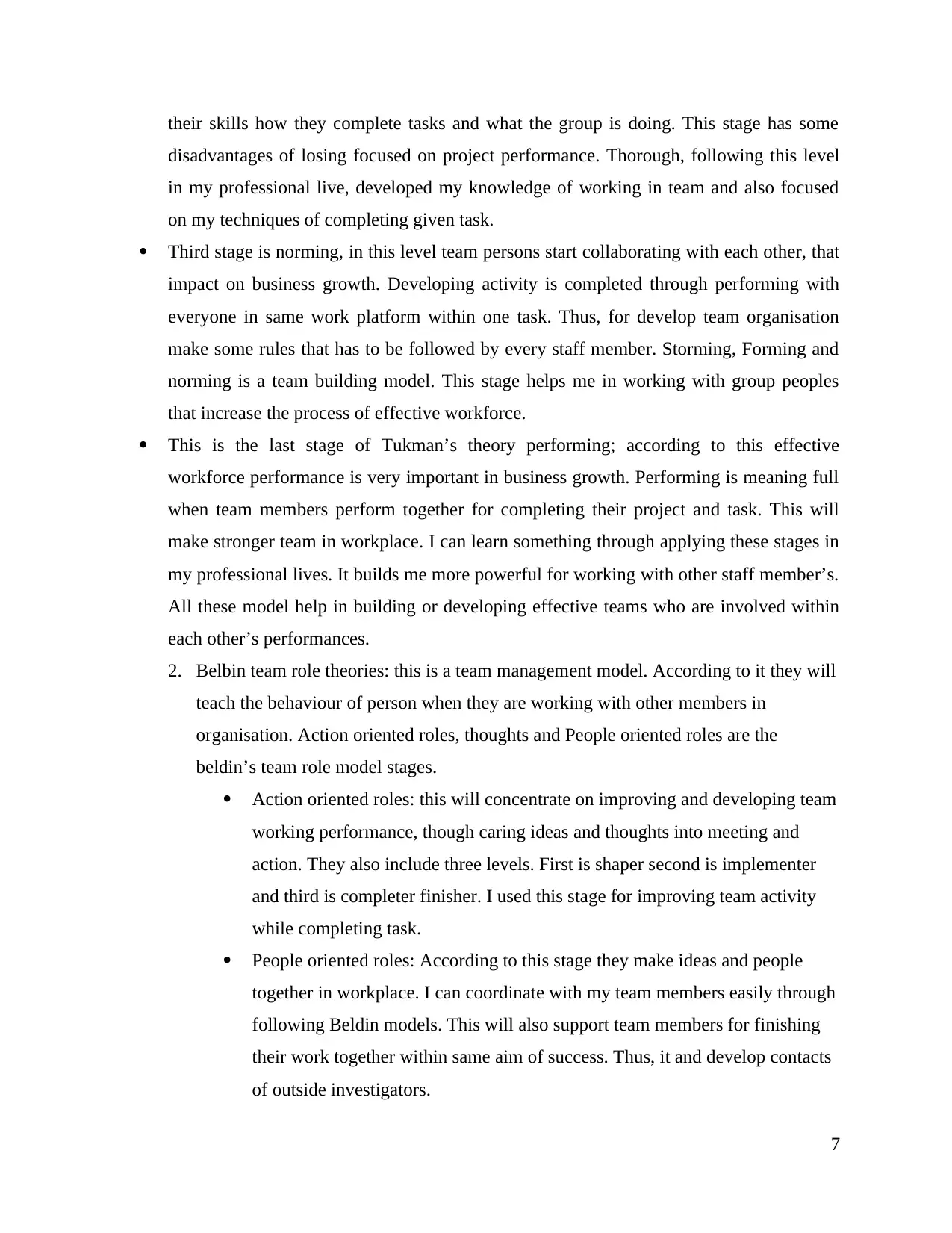
their skills how they complete tasks and what the group is doing. This stage has some
disadvantages of losing focused on project performance. Thorough, following this level
in my professional live, developed my knowledge of working in team and also focused
on my techniques of completing given task.
Third stage is norming, in this level team persons start collaborating with each other, that
impact on business growth. Developing activity is completed through performing with
everyone in same work platform within one task. Thus, for develop team organisation
make some rules that has to be followed by every staff member. Storming, Forming and
norming is a team building model. This stage helps me in working with group peoples
that increase the process of effective workforce.
This is the last stage of Tukman’s theory performing; according to this effective
workforce performance is very important in business growth. Performing is meaning full
when team members perform together for completing their project and task. This will
make stronger team in workplace. I can learn something through applying these stages in
my professional lives. It builds me more powerful for working with other staff member’s.
All these model help in building or developing effective teams who are involved within
each other’s performances.
2. Belbin team role theories: this is a team management model. According to it they will
teach the behaviour of person when they are working with other members in
organisation. Action oriented roles, thoughts and People oriented roles are the
beldin’s team role model stages.
Action oriented roles: this will concentrate on improving and developing team
working performance, though caring ideas and thoughts into meeting and
action. They also include three levels. First is shaper second is implementer
and third is completer finisher. I used this stage for improving team activity
while completing task.
People oriented roles: According to this stage they make ideas and people
together in workplace. I can coordinate with my team members easily through
following Beldin models. This will also support team members for finishing
their work together within same aim of success. Thus, it and develop contacts
of outside investigators.
7
disadvantages of losing focused on project performance. Thorough, following this level
in my professional live, developed my knowledge of working in team and also focused
on my techniques of completing given task.
Third stage is norming, in this level team persons start collaborating with each other, that
impact on business growth. Developing activity is completed through performing with
everyone in same work platform within one task. Thus, for develop team organisation
make some rules that has to be followed by every staff member. Storming, Forming and
norming is a team building model. This stage helps me in working with group peoples
that increase the process of effective workforce.
This is the last stage of Tukman’s theory performing; according to this effective
workforce performance is very important in business growth. Performing is meaning full
when team members perform together for completing their project and task. This will
make stronger team in workplace. I can learn something through applying these stages in
my professional lives. It builds me more powerful for working with other staff member’s.
All these model help in building or developing effective teams who are involved within
each other’s performances.
2. Belbin team role theories: this is a team management model. According to it they will
teach the behaviour of person when they are working with other members in
organisation. Action oriented roles, thoughts and People oriented roles are the
beldin’s team role model stages.
Action oriented roles: this will concentrate on improving and developing team
working performance, though caring ideas and thoughts into meeting and
action. They also include three levels. First is shaper second is implementer
and third is completer finisher. I used this stage for improving team activity
while completing task.
People oriented roles: According to this stage they make ideas and people
together in workplace. I can coordinate with my team members easily through
following Beldin models. This will also support team members for finishing
their work together within same aim of success. Thus, it and develop contacts
of outside investigators.
7
⊘ This is a preview!⊘
Do you want full access?
Subscribe today to unlock all pages.

Trusted by 1+ million students worldwide
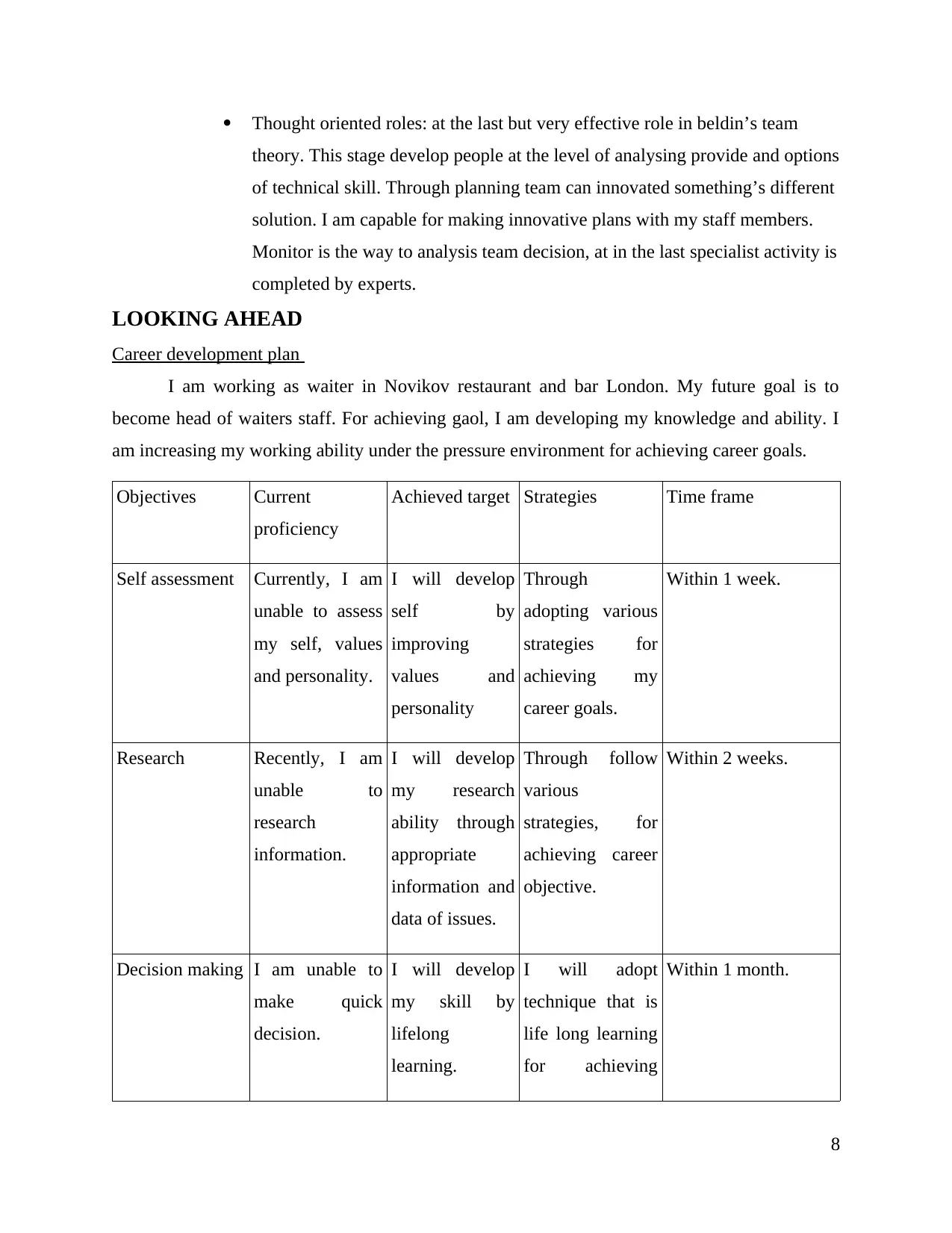
Thought oriented roles: at the last but very effective role in beldin’s team
theory. This stage develop people at the level of analysing provide and options
of technical skill. Through planning team can innovated something’s different
solution. I am capable for making innovative plans with my staff members.
Monitor is the way to analysis team decision, at in the last specialist activity is
completed by experts.
LOOKING AHEAD
Career development plan
I am working as waiter in Novikov restaurant and bar London. My future goal is to
become head of waiters staff. For achieving gaol, I am developing my knowledge and ability. I
am increasing my working ability under the pressure environment for achieving career goals.
Objectives Current
proficiency
Achieved target Strategies Time frame
Self assessment Currently, I am
unable to assess
my self, values
and personality.
I will develop
self by
improving
values and
personality
Through
adopting various
strategies for
achieving my
career goals.
Within 1 week.
Research Recently, I am
unable to
research
information.
I will develop
my research
ability through
appropriate
information and
data of issues.
Through follow
various
strategies, for
achieving career
objective.
Within 2 weeks.
Decision making I am unable to
make quick
decision.
I will develop
my skill by
lifelong
learning.
I will adopt
technique that is
life long learning
for achieving
Within 1 month.
8
theory. This stage develop people at the level of analysing provide and options
of technical skill. Through planning team can innovated something’s different
solution. I am capable for making innovative plans with my staff members.
Monitor is the way to analysis team decision, at in the last specialist activity is
completed by experts.
LOOKING AHEAD
Career development plan
I am working as waiter in Novikov restaurant and bar London. My future goal is to
become head of waiters staff. For achieving gaol, I am developing my knowledge and ability. I
am increasing my working ability under the pressure environment for achieving career goals.
Objectives Current
proficiency
Achieved target Strategies Time frame
Self assessment Currently, I am
unable to assess
my self, values
and personality.
I will develop
self by
improving
values and
personality
Through
adopting various
strategies for
achieving my
career goals.
Within 1 week.
Research Recently, I am
unable to
research
information.
I will develop
my research
ability through
appropriate
information and
data of issues.
Through follow
various
strategies, for
achieving career
objective.
Within 2 weeks.
Decision making I am unable to
make quick
decision.
I will develop
my skill by
lifelong
learning.
I will adopt
technique that is
life long learning
for achieving
Within 1 month.
8
Paraphrase This Document
Need a fresh take? Get an instant paraphrase of this document with our AI Paraphraser
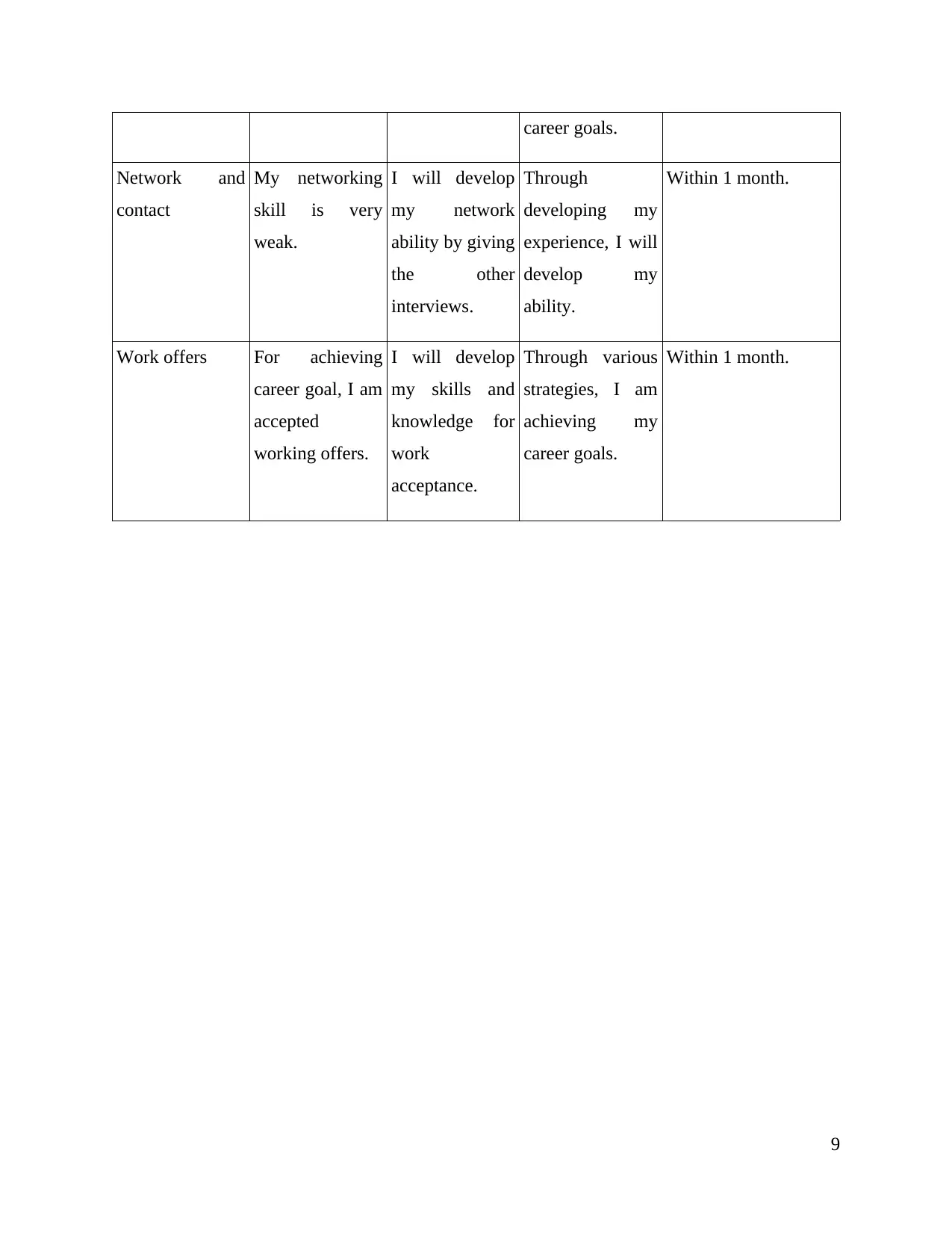
career goals.
Network and
contact
My networking
skill is very
weak.
I will develop
my network
ability by giving
the other
interviews.
Through
developing my
experience, I will
develop my
ability.
Within 1 month.
Work offers For achieving
career goal, I am
accepted
working offers.
I will develop
my skills and
knowledge for
work
acceptance.
Through various
strategies, I am
achieving my
career goals.
Within 1 month.
9
Network and
contact
My networking
skill is very
weak.
I will develop
my network
ability by giving
the other
interviews.
Through
developing my
experience, I will
develop my
ability.
Within 1 month.
Work offers For achieving
career goal, I am
accepted
working offers.
I will develop
my skills and
knowledge for
work
acceptance.
Through various
strategies, I am
achieving my
career goals.
Within 1 month.
9
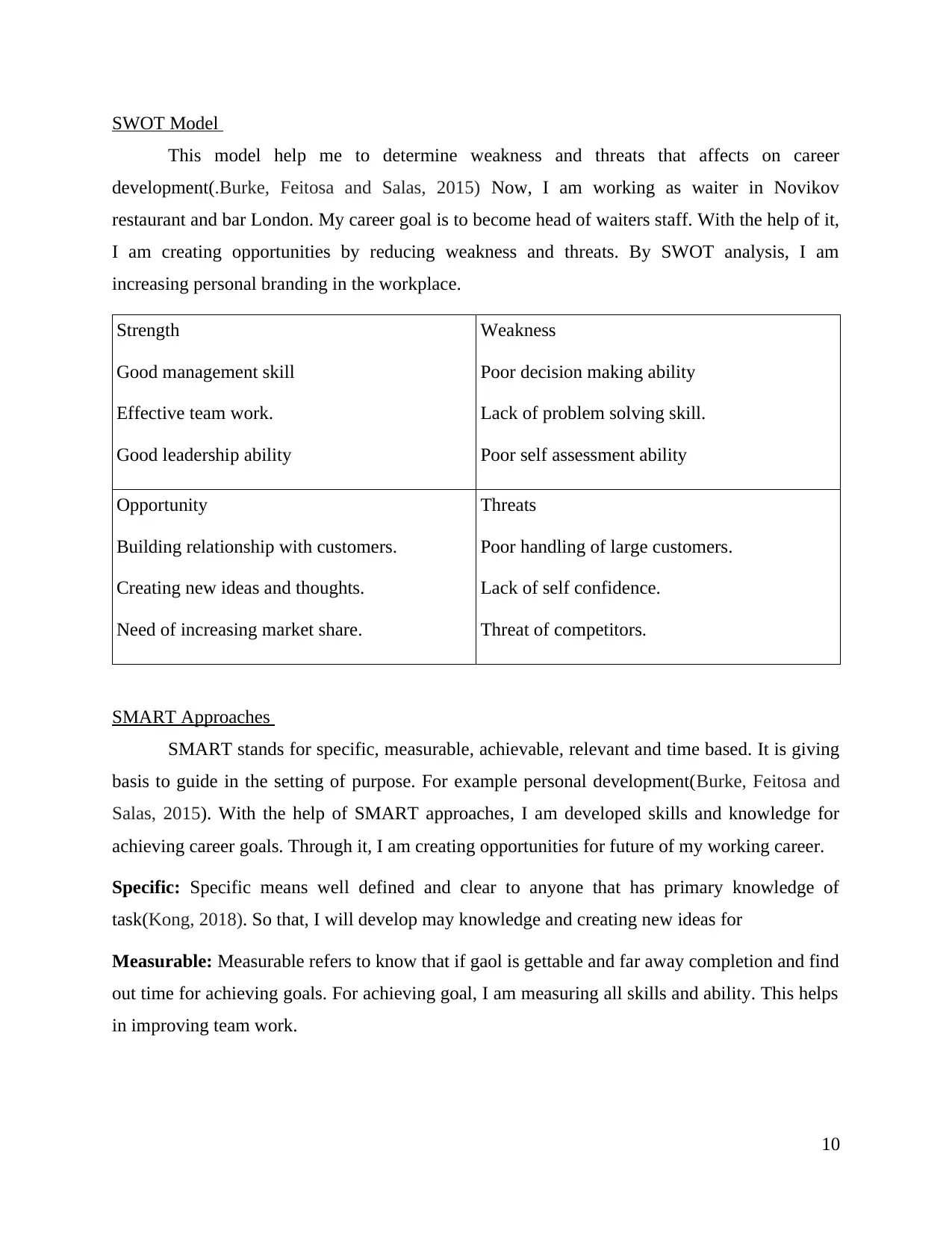
SWOT Model
This model help me to determine weakness and threats that affects on career
development(.Burke, Feitosa and Salas, 2015) Now, I am working as waiter in Novikov
restaurant and bar London. My career goal is to become head of waiters staff. With the help of it,
I am creating opportunities by reducing weakness and threats. By SWOT analysis, I am
increasing personal branding in the workplace.
Strength
Good management skill
Effective team work.
Good leadership ability
Weakness
Poor decision making ability
Lack of problem solving skill.
Poor self assessment ability
Opportunity
Building relationship with customers.
Creating new ideas and thoughts.
Need of increasing market share.
Threats
Poor handling of large customers.
Lack of self confidence.
Threat of competitors.
SMART Approaches
SMART stands for specific, measurable, achievable, relevant and time based. It is giving
basis to guide in the setting of purpose. For example personal development(Burke, Feitosa and
Salas, 2015). With the help of SMART approaches, I am developed skills and knowledge for
achieving career goals. Through it, I am creating opportunities for future of my working career.
Specific: Specific means well defined and clear to anyone that has primary knowledge of
task(Kong, 2018). So that, I will develop may knowledge and creating new ideas for
Measurable: Measurable refers to know that if gaol is gettable and far away completion and find
out time for achieving goals. For achieving goal, I am measuring all skills and ability. This helps
in improving team work.
10
This model help me to determine weakness and threats that affects on career
development(.Burke, Feitosa and Salas, 2015) Now, I am working as waiter in Novikov
restaurant and bar London. My career goal is to become head of waiters staff. With the help of it,
I am creating opportunities by reducing weakness and threats. By SWOT analysis, I am
increasing personal branding in the workplace.
Strength
Good management skill
Effective team work.
Good leadership ability
Weakness
Poor decision making ability
Lack of problem solving skill.
Poor self assessment ability
Opportunity
Building relationship with customers.
Creating new ideas and thoughts.
Need of increasing market share.
Threats
Poor handling of large customers.
Lack of self confidence.
Threat of competitors.
SMART Approaches
SMART stands for specific, measurable, achievable, relevant and time based. It is giving
basis to guide in the setting of purpose. For example personal development(Burke, Feitosa and
Salas, 2015). With the help of SMART approaches, I am developed skills and knowledge for
achieving career goals. Through it, I am creating opportunities for future of my working career.
Specific: Specific means well defined and clear to anyone that has primary knowledge of
task(Kong, 2018). So that, I will develop may knowledge and creating new ideas for
Measurable: Measurable refers to know that if gaol is gettable and far away completion and find
out time for achieving goals. For achieving goal, I am measuring all skills and ability. This helps
in improving team work.
10
⊘ This is a preview!⊘
Do you want full access?
Subscribe today to unlock all pages.

Trusted by 1+ million students worldwide
1 out of 15
Related Documents
Your All-in-One AI-Powered Toolkit for Academic Success.
+13062052269
info@desklib.com
Available 24*7 on WhatsApp / Email
![[object Object]](/_next/static/media/star-bottom.7253800d.svg)
Unlock your academic potential
Copyright © 2020–2026 A2Z Services. All Rights Reserved. Developed and managed by ZUCOL.




